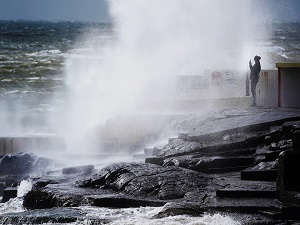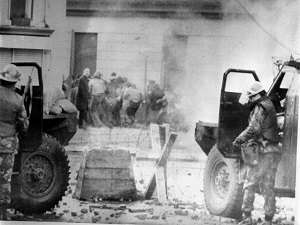
By Deborah McAleese
Lawyers for a former British soldier charged in connection with the fatal shooting of an unarmed man in Northern Ireland in 1974 have asked a judge to throw out the case against him.
Dennis Hutchings' legal team told a crown court judge in Belfast there was no evidence to prove that the 75-year-old had used force unlawfully when the man was shot dead by an army patrol.
Hutchings is accused of the attempted murder of John-Pat Cunningham, who was 27.
Mr Cunningham, who had learning difficulties, was shot dead by a British army patrol in June 1974 close to Benburb, a village on the Irish border between counties Armagh and Tyrone.
Hutchings, of Cawsand, Cornwall, is also facing a charge of attempting to cause grievous bodily harm to Mr Cunningham.
He appeared before Belfast Crown Court on Friday where his legal team applied to Crown Court Judge Mr Justice Treacy to dismiss the charges against him, citing a lack of evidence.
Hutchings sat in the dock with a hearing device to listen to the application from his legal team.
A group of supporters, who had earlier gathered outside the court to protest against the prosecution, sat in the public gallery throughout the three-hour hearing.
The court was told that Mr Cunningham was a vulnerable adult with a fear of people in uniform.
He was running away from an Army patrol when he was shot in the back, the court heard.
Hutchings was the most senior soldier in the patrol which opened fire on Mr Cunningham as he ran across a field.
Five rounds were fired and Mr Cunningham was struck at least twice.
A barrister for the Public Prosecution Service told the court that three shots were fired from Hutchings' rifle.
Another soldier, referred to as Soldier B and who is now dead, fired two shots during the incident, the court was told.
The barrister admitted that with no forensic evidence he could not say if the fatal shot was fired by Hutchings or by Soldier B.
However, he said that Hutchings had not acted within the rules of engagement - a military directive to describe the circumstances under which military force can be used.
"The defendant would have had the deceased in his sights for a very significant period of time before he decided to fire three times.
"The shots fired were described as sharp and close together," the barrister said.
He added: "That's completely inconsistent with warning shots. There was no explanation for the repeated firing of the weapon.
"He has not acted within the rules of engagement."
However, a defence barrister said there is "no evidence whatsoever" that Hutchings fired any shots, "other than inference of three rounds missing (from his rifle)".
He added that there is also no evidence as to whether or not the rules of engagement were followed.
"(The Crown) have to have some evidence those rules weren't complied with but they don't have that.
"It's not the defendant's obligation to prove if the rules of engagement were or weren't dealt with. It's for the Crown to produce evidence that they weren't," he said.
Mr Justice Treacy told the court he needed some time to consider the arguments before making a ruling in the application.
The case was adjourned to a date yet to be fixed.


 Storm Amy sparks school closures in Northern Ireland as Republic extends warning
Storm Amy sparks school closures in Northern Ireland as Republic extends warning
 Rare seabirds breed on Rathlin Island for first time in decades
Rare seabirds breed on Rathlin Island for first time in decades
 UK to be battered by 80mph winds as first named storm of season approaches
UK to be battered by 80mph winds as first named storm of season approaches
 Family of murdered councillor Patsy Kelly receive police apology
Family of murdered councillor Patsy Kelly receive police apology
 Victim pretended to be dead after being shot on Bloody Sunday
Victim pretended to be dead after being shot on Bloody Sunday